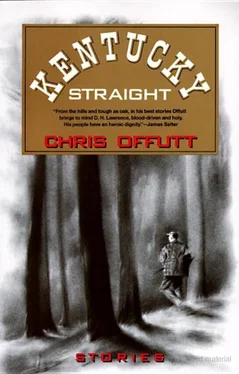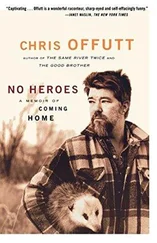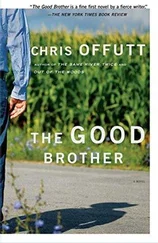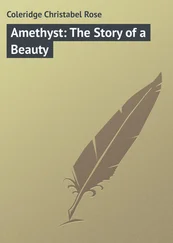“Save me some,” Mercer said, and tossed the bottle.
Coe caught it, uncapped the pint, and took a quick pull. He closed his eyes at the cool burn.
“That dozer man’s dumb as dirt,” he said.
“Boy of his is all right,” Mercer said. “Can’t say how he got that way, but he did.”
“The son don’t have to be the pa.”
“Around here, he mostly is.”
“You people got it bad as us.”
“Maybe,” Mercer said. “I never knowed nobody else.”
They looked away from each other as raindrops pocked the mud. Coe stared into the mist, thinking that he’d been wrong, that these people had it worse. Coe knew how black folks were. He knew how they got that way, and who to blame. The hillbillies didn’t.
They stood without speaking until Coe saw the men appear in the fog and approach the tow truck.
“Something done went wrong,” Coe said.
They crossed the mud to the men squatting around the truck’s rear end. Bobby lay on his back, legs pinned beneath the truck’s doubled tires. His eyes were wide and he was shivering. Rain pooled in the creases of his clothes.
“You hurt bad?” Old Bob asked.
“Can’t tell,” Bobby said. “Never did feel nothing down there.” He coughed and a red bubble formed at his mouth. “Get me up.”
“Swing that dozer around,” Richards said to Old Bob. “If I drive, the tires will spin on him. You’ve got to haul that truck off nice and slow.” His voice lowered. “No more tricks, you damn fool.”
Old Bob stumbled to the bulldozer, slowed by the weight of mud on his boots. He turned and yelled. “Hey, by God, where’s that whiskey?”
Coe held the bottle up.
“Hell with it,” Old Bob said.
“Suits me,” said Mercer.
He yanked the bottle from Coe’s hand and drained the last of the clear liquor. The men stared, surprised that Mercer would drink after Coe.
The tow truck lurched a few yards, dappling everyone with mud. Bobby’s ruined knee spurted a red arc. Then another. And another. The men watched, bewildered and afraid. They had slaughtered hogs in autumn and field-dressed deer in the woods. They’d seen mangled men dragged from the mines — crushed, turned blue from lack of oxygen, charred by a shaft fire. But none had watched a man slowly die.
“Goddam it,” Old Bob yelled. He jumped from the bulldozer. “That’s my goddam boy!”
He knelt and grabbed Bobby’s knee. The severed leg slid away. It bobbed in the hole where Bobby lay, and turned the water pink. A long sharp rim of rock jutted from the mud below Bobby’s stump.
“We got to do something!” Old Bob said. His eyehole held a thumb-sized wedge of clay.
“Not much a body can do,” said a man.
“Tourniquet won’t do no good,” said another.
The rest nodded around him. They’d all lost kin; it couldn’t be helped. Coe shouldered through the men and knelt in the mud. He pressed his hand against the open wound.
“We need a rope or piece of harness,” Coe said. “I worked alongside a horse doc nigh six year.”
Old Bob knocked Coe’s arm away. “Reach for him again and you’ll draw back a nub!”
Blood spouted the air twice before Coe stopped it with his palm. His other hand held Old Bob back.
“Watch what you’re doing there,” said one of the men. His voice was low and hard and the others moved to him. They waited in the cold gray rain, ready to back the man they knew.
Bobby leaned forward and saw the space where his leg should be. He fell back laughing a high-pitched cry. “Chop off the other one,” he said. “I don’t need them either one.”
The men glanced at each other, avoiding Coe’s impassive face. One by one they settled their patient gaze on Mr. Richards. He was the boss, he would tell them what to do. Richards blew rain from his lips.
“He did work on a horse farm,” he said. “But I can’t say what all he knows.”
The men rubbed their mouths and adjusted their hats. Each had a firm opinion but giving an order would mark him as uppity. They stared at Bobby, their sweat mixing with rain.
Mercer removed the snakeskin belt his father had made. He jingled the buckle. Everyone studied Mercer and the belt he held.
Slowly, carefully to ensure that the rest agreed, they began nodding to one another. They looked at Coe’s hands and waited. He did nothing until a man spoke, head turned to Mercer.
“Won’t hurt Bobby no worse to try,” the man said. “Better take hold of Old Bob first.”
Richards pulled him away. Old Bob released his son easily, too easily, and Mercer realized he had fainted. Richards laid him in the flowing silty mud.
Coe looped the belt twice on Bobby’s thigh and threaded the buckle very tight. He pinched the exposed artery, tilted sideways, and pulled a knife from his pocket.
“Somebody open this,” he said.
The men looked at Mercer. He took the knife, yanked the blade out, and passed it back. Coe cut Bobby’s pants and folded the flaps of cloth aside. He sliced the withered leg from knee to midthigh and gently tugged six inches of artery from the slit. Twice it slipped from his hands like a tiny, wriggling snake. Blood soaked into the earth. Coe squeezed the artery, looped a knot in its end, and lifted his hands away. The blood flow strained against the knot, leaking to the mud. Coe pulled the end tighter and the bleeding stopped. The artery bulged dark against the pale knot. Coe placed his cap over the stump.
“Get him to the truck,” he said.
The men moved to Bobby as if he had four corners. Coe cradled his head. They lifted him and began moving slowly down the muddy slope. Mercer watched until they faded into fog rising from the hollow’s warmth. At his feet Coe’s knife lay half-buried in the mud. Mercer cleaned the blade against his pants and slipped it in his pocket.
Mr. Richards crouched behind Old Bob and shook him awake. Dark rain trickled from his eye socket. Richards raised him to his feet and turned to Mercer.
“Reckon we ought not leave that leg laying out here,” he said. “Dogs might get it, or something.”
Air in the boot made it float on the puddle’s surface. Mercer lifted it by the heel, holding the leg away from his body. It didn’t weigh much. He carried it down the hill, wondering what to do with it.
His brother stood alone in the road. Rain poured from Aaron’s belly like a gutterless roof.
“Where’d they all go?” Mercer said.
“Took Bobby to the doctor.”
“Coe, too?”
“Who?”
“Feller driving the pickup.”
“You mean the nigger?”
“No,” said Mercer. “That’s not who I mean, you son of a bitch.”
He held Bobby’s leg like a weapon. Aaron frowned and spat tobacco.
“Shouldn’t say such about Mommy,” he said. “What’s that you got there?”
“Bobby’s leg.”
“Never was no count.”
Mercer dropped it, splashing mud on his pants. Wind pelted rain against their backs, and dark sky moved over the ridge.
“Hill ain’t going to hold,” Mercer said.
“That trailer washes down in the road,” Aaron said, “I’ll just leave it lay and plow a new road around it. I ain’t living nowhere else but Crosscut Ridge.” He sighed and looked at the sky. Water ran from his eyebrows. “Sure did get late early today.”
Mercer walked to the pickup where Coe sat and smoked. In the cab, Mercer held his wet shirt away from his body. He was suddenly cold. Coe dropped his cigarette out the window. Mercer dug in his pocket.
“Here’s your knife,” he said.
Coe took the knife and bounced it in his palm. He glanced at Mercer, then offered the knife.
“You might need it,” Coe said.
“I can’t take a man’s knife.”
“It’s yours.” Coe tossed it in Mercer’s lap. “Ain’t that good a knife anyway.”
Читать дальше












